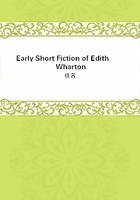
第59章
This is the story that, in the dining-room of the old Beacon Street house (now the Aldebaran Club), Judge Anthony Bracknell, of the famous East India firm of Bracknell & Saulsbee, when the ladies had withdrawn to the oval parlour (and Maria's harp was throwing its gauzy web of sound across the Common), used to relate to his grandsons, about the year that Buonaparte marched upon Moscow.
I
"Him Venice!" said the Lascar with the big earrings; and Tony Bracknell, leaning on the high gunwale of his father's East Indiaman, the Hepzibah B., saw far off, across the morning sea, a faint vision of towers and domes dissolved in golden air.
It was a rare February day of the year 1760, and a young Tony, newly of age, and bound on the grand tour aboard the crack merchantman of old Bracknell's fleet, felt his heart leap up as the distant city trembled into shape. VENICE! The name, since childhood, had been a magician's wand to him. In the hall of the old Bracknell house at Salem there hung a series of yellowing prints which Uncle Richard Saulsbee had brought home from one of his long voyages: views of heathen mosques and palaces, of the Grand Turk's Seraglio, of St. Peter's Church in Rome; and, in a corner--the corner nearest the rack where the old flintlocks hung--a busy merry populous scene, entitled: ST. MARK'S SQUARE IN VENICE. This picture, from the first, had singularly taken little Tony's fancy. His unformulated criticism on the others was that they lacked action. True, in the view of St. Peter's an experienced-looking gentleman in a full-bottomed wig was pointing out the fairly obvious monument to a bashful companion, who had presumably not ventured to raise his eyes to it; while, at the doors of the Seraglio, a group of turbaned infidels observed with less hesitancy the approach of a veiled lady on a camel. But in Venice so many things were happening at once--more, Tony was sure, than had ever happened in Boston in a twelve-month or in Salem in a long lifetime. For here, by their garb, were people of every nation on earth, Chinamen, Turks, Spaniards, and many more, mixed with a parti-coloured throng of gentry, lacqueys, chapmen, hucksters, and tall personages in parsons' gowns who stalked through the crowd with an air of mastery, a string of parasites at their heels. And all these people seemed to be diverting themselves hugely, chaffering with the hucksters, watching the antics of trained dogs and monkeys, distributing doles to maimed beggars or having their pockets picked by slippery-looking fellows in black--the whole with such an air of ease and good-humour that one felt the cut-purses to be as much a part of the show as the tumbling acrobats and animals.
As Tony advanced in years and experience this childish mumming lost its magic; but not so the early imaginings it had excited.
For the old picture had been but the spring-board of fancy, the first step of a cloud-ladder leading to a land of dreams. With these dreams the name of Venice remained associated; and all that observation or report subsequently brought him concerning the place seemed, on a sober warranty of fact, to confirm its claim to stand midway between reality and illusion. There was, for instance, a slender Venice glass, gold-powdered as with lily-pollen or the dust of sunbeams, that, standing in the corner cabinet betwixt two Lowestoft caddies, seemed, among its lifeless neighbours, to palpitate like an impaled butterfly. There was, farther, a gold chain of his mother's, spun of that same sun-pollen, so thread-like, impalpable, that it slipped through the fingers like light, yet so strong that it carried a heavy pendant which seemed held in air as if by magic. MAGIC! That was the word which the thought of Venice evoked. It was the kind of place, Tony felt, in which things elsewhere impossible might naturally happen, in which two and two might make five, a paradox elope with a syllogism, and a conclusion give the lie to its own premiss. Was there ever a young heart that did not, once and again, long to get away into such a world as that? Tony, at least, had felt the longing from the first hour when the axioms in his horn-book had brought home to him his heavy responsibilities as a Christian and a sinner. And now here was his wish taking shape before him, as the distant haze of gold shaped itself into towers and domes across the morning sea!
The Reverend Ozias Mounce, Tony's governor and bear-leader, was just putting a hand to the third clause of the fourth part of a sermon on Free-Will and Predestination as the Hepzibah B.'s anchor rattled overboard. Tony, in his haste to be ashore, would have made one plunge with the anchor; but the Reverend Ozias, on being roused from his lucubrations, earnestly protested against leaving his argument in suspense. What was the trifle of an arrival at some Papistical foreign city, where the very churches wore turbans like so many Moslem idolators, to the important fact of Mr. Mounce's summing up his conclusions before the Muse of Theology took flight? He should be happy, he said, if the tide served, to visit Venice with Mr. Bracknell the next morning.
The next morning, ha!--Tony murmured a submissive "Yes, sir," winked at the subjugated captain, buckled on his sword, pressed his hat down with a flourish, and before the Reverend Ozias had arrived at his next deduction, was skimming merrily shoreward in the Hepzibah's gig.